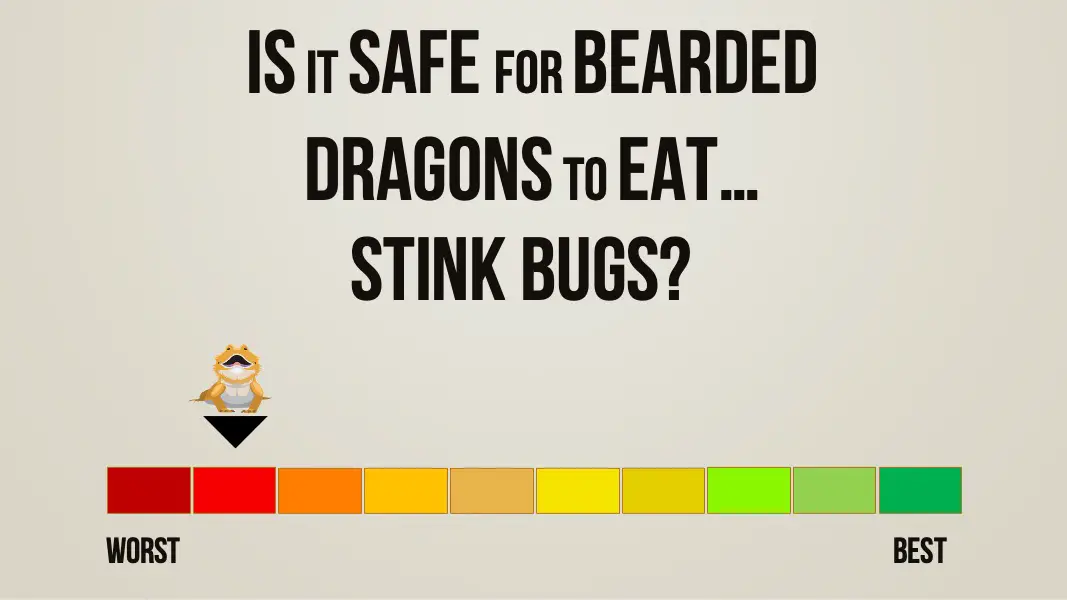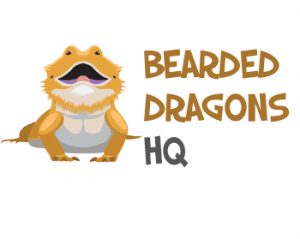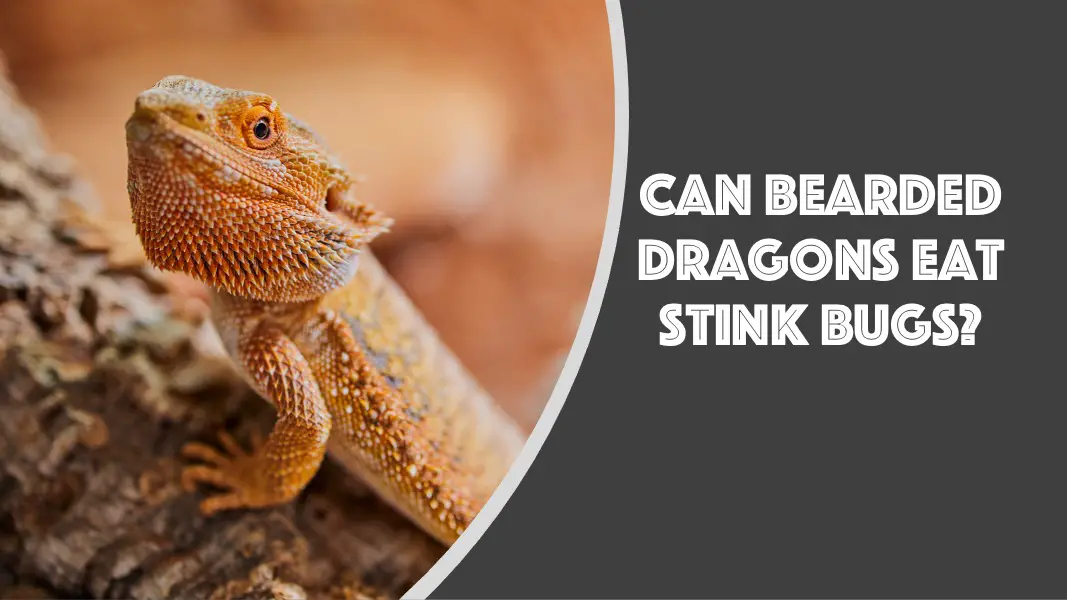The answer is no, you should not allow your dragon to eat stink bugs. In fact, bearded dragons are not supposed to eat any wild bugs at all.
Bearded dragons can be sickened by stink bugs, which are semi-toxic to them and may contain pesticides, poisons, and parasites. Keeping your dragon from eating a bug may be challenging, but there are ways to keep bugs out of your house where it can be eaten by your dragon.
To learn more about what to do if your bearded dragon eats a stink bug or other wild insect, please continue reading this article. Check out which insects bearded dragons can eat?

Are Stink Bugs Bad for Bearded Dragons?
Bearded dragons can become unwell or possibly die if they eat stink bugs, which are semi-toxic to the reptiles. Regardless of whether they are the same as the ones you can buy at the shop, do not allow your bearded dragon to consume any wild insects. You can’t tell where they come from or what substances they might be carrying because of the uncertainty.
Parasites can also be carried by stink bugs and other wild insects. Your dragon would then be infected with whatever parasites the stink bug was carrying.. Because of their vulnerability to parasites, bearded dragons must be housed in a climate-controlled environment at all times.
Stay away from regions where stink bugs are more common if you want to keep your dragon from eating one. You may want to keep your dragon indoors if stink bugs are a common problem in your area of the country.
Take your dragon to the vet immediately if it consumes a stink bug that has made its way into your home. Sickness or death is possible for your bearded dragon. Ensure that your dragon’s enclosure is completely covered to prevent any wild bugs from entering your home, as well as preventing your dragon from getting a chance to consume one.
For some individuals, saving a few pennies means feeding their dragons wild insects and stink bugs, but doing so may end up costing them more than if they’d bought them at a pet store. store. Your dragon’s health and safety are more important than saving money, especially if you have to take them to the veterinarian. Feeding your dragon stink bugs and other wild insects may wind up costing you more in the long run, both financially and in terms of the health of your dragon.
5 Reasons Stink Bugs are Bad for Bearded Dragons
They might become a staple in your dragon’s diet and cause it to reject other foods.
Stink bugs and other insects may become a favorite food for some bearded dragons. It’s possible that if they get used to eating stink bugs (and other wild insects), your dragon will stop eating its other favorite foods. Some dragons are so picky about their food that they’ll only eat what they’re accustomed to. Some even starve themselves to death.
This is especially true for dragons that are more discerning. Bearded dragons are obstinate creatures, so don’t expect them to consume what you feed them just because you believe they’ll get hungry. It is possible that your bearded dragon could starve to death because you refuse to give it a potentially poisonous natural insect.
Impaction could be caused by stink bugs.
After consuming a stink bug, your bearded dragon may be suffering from impaction. When bearded dragons have a stomach ache, their feces may be watery, although this isn’t always the case.
It is possible that your dragon will refuse to eat because it is having difficulty digesting the stink bug. Stinkbugs can be treated with medicine and consultation from a veterinarian.
They Can Carry Parasites
Insects like stink bugs can contain parasites, and anything your dragon absorbed from that insect has been passed to them. Problems can arise in a variety of ways and at a rapid pace.
If you find your beardie eating any wild bug, not just a stink bug, quickly take them to the vet for a check-up. The longer you wait to observe how your dragon reacts, the more likely it is that it will be too late.
Bearded dragons are already vulnerable to parasites, and this vulnerability is only going to get worse. Giving wild dragon stink bugs or other insects food will simply increase their vulnerability.
They Can Carry Pesticides
You have no idea what insecticide or other substances those bugs may have carried with them. Even if they appear to be in good health, they’ve been out of your sight and out of mind for some time.
Poison to Bearded Dragons
However, even if a dragon appears fine after eating a stink bug, bearded dragons should not eat stink bugs. Even if you don’t notice, your dragon will most certainly fall unwell. Even if you can’t look inside their digestive system, it’s impossible for your bearded dragon to tell you how they’re feeling.
Insects for Bearded Dragons
- Can Bearded Dragons Eat Rolly Pollies
- Can Bearded Dragons Eat Silkworms
- Can Bearded Dragons Eat Slugs/
My Bearded Dragon Ate a Stink Bug. What Should I Do?
Take your bearded dragon to the veterinarian right away if it eats a stink bug. To assist your dragon digest and get rid of the bug, you may need to give it a lot of baths. Depending on the condition of your bearded dragon, your veterinarian may recommend a specific diet or medication to treat it.
Look out for signs of illness, such as atypical feces (runny or absence thereof), a decrease in appetite or weight loss, a loss of color, lethargy or dehydration (wrinkled and sunken eyes). Even if you’ve previously seen your veterinarian and noticed any of these signs, don’t hesitate to reach out to them again. Your dragon’s health is more at risk from wild bugs than you might think.
Take precautionary precautions to prevent your dragon from eating any more stink bugs. Dragons can’t be prevented from eating wild bugs, but there are techniques to reduce the likelihood of this happening.
How to Stop My Bearded Dragon from Eating Stink Bugs
Always keep a watch on your dragon when it is outside of its enclosure. Your dragon should never be left unattended or unmonitored.
If you find a wild bug in your house, cover the cage with a screen or mesh to keep it from flying into the enclosure.
Avoid areas where stink bugs are more common, especially outside. When stink bugs are searching for a place to warm up in the cold. Keeping this in mind, it’s imperative that you seal your home.
Keep your home bug-free by sealing all openings and repairing any that may be present. A little caulk may go a long way. Keeping your home clean and repairing broken screens are also helpful.
Spray window sills and other spots around and inside your home where you’ve spotted stink bugs with a mixture of one part water, one part dish soap, and one part lavender oil. This alone is unlikely to keep all stink bugs away, although it may deter them a little.
How to Stop My Bearded Dragon from Eating Stink Bugs
Smelly bugs should be removed from the house with a vacuum. Keep an odor neutralizer in the vacuum bag and then promptly toss it away to keep the stench from escaping. You could end up with a lingering smell in your vacuum and home if you don’t do this.
Another approach is to use a pesticide, although this is not advised. If, as said previously, your bearded dragon eats a fly that contains insecticide, it will suffer the consequences. Pesticide may be an option for those who want to use it outside of their homes and do not own any other animals.
Stink bug prevention might be as simple as using catnip. Gardening can be done both inside and outside your home. Also, you can use it to treat window sills and other vulnerable areas of your property. In addition, this will keep other bugs away from your home.
Alternative Foods For Bearded Dragons
Sometimes a bearded dragon can’t resist a stink bug or other wild insect, despite your best preventative efforts. Because of this possibility, it’s a good idea to have alternative food ready in case it happens.
Some examples of instead foods include:
Hatchlings – pinky mice
Juveniles – phoenix worms (pinhead crickets for babies) and waxworms (only as an occasional treat due to their fat content)
Adults – Jackie’s protein powder blend and/or optic probiotics for those who don’t handle insects well. Also, hornworms may be fed as an occasional treat to adults.
Larvae – mealworms and super worms larvae (only as an occasional treat due to their fat content).
Conclusion
Even if your bearded dragon appears healthy, keep in mind that you cannot see what’s going on within its stomach. They can’t tell you how they’re feeling, either. Their symptoms may be so obvious that it’s hard to notice them. It’s possible they’re having a terrible stomach discomfort that could be fatal.
Other people’s bearded dragons may be fed stink bugs and other wild insects, but this can be harmful to your dragon and dangerous to you and others’. Avoid feeding your bearded dragon stink bugs and wild insects, especially if you’re just getting started with a bearded dragon. Your dragon’s life could be cut short by a single slip-up or stroke of bad luck. Preventative steps should be taken if you reside somewhere where stink bugs and other wild insects are a concern.

